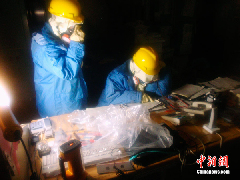|
Tokyo Electric Power Co. (TEPCO) said Friday that the three workers were exposed to radiation 10,000 times the normal level while dealing with an emergency at the No. 3 reactor of the troubled Fukushima Daiichi nuclear power plant, according to Xinhua News Agency.
 |
|
Two staff workers from the Tokyo Electric Power Company check equipment and collect data in the control room of the Fukushima Daiichi nuclear power plant on March 23, 2011.
|
The finding of the high dose of radiation indicated it was likely that part of the fuel in the reactor or the spent fuel stored in the pool in the reactor building had been damaged.
Two of them were taken to the Fukushima Medical University hospital as their feet were injured, possibly by beta rays, and contaminated by radioactive substances.
The two victims are employees of a partner of TEPCO, owner and operator of the Fukushima nuclear plants. They were laying power cables with their feet submerged in the water of the turbine room at the reactor shortly after midday when the radiation exposure occurred.
They will be transferred later Friday to the National Institute of Radiological Sciences in Chiba City for further examination.
Radioactive leaks were detected after a series of explosions and fires at four of the plant's six reactors following the failure of their cooling functions due to the damaged power supplies in the 9.0 magnitude earthquake that hit Japan on March 11.
Radioactive water crisis spreads
Japanese authorities on Thursday detected rising levels of radioactive iodine at water purification facilities near Tokyo and officials have advised that tap water should not be given to infants to drink in the affected areas, sparking panic-buying of already scarce bottled water, according to Xinhua.
Local officials in Tokyo's neighboring Chiba Prefecture said they detected around 220 becquerels of radioactive iodine-131 per liter in the city of Matsudo's water supply on Wednesday.
The recommended maximum limit is 100 becquerels per liter for children under 1 year of age, and 300 becquerels for adults.
Radioactive iodine levels found at another purification plants in the region were also nearly double the recommended safe limit for infants at 180 becquerels per liter, the officials said.
Also bordering the Tokyo metropolitan area, local officials at the city of Kawaguchi in Saitama Prefecture said radioactive iodine rose to 120 becquerels per liter of water at its purification plant on Tuesday.
Following levels of iodine spiking to 210 becquerels on Tuesday at a purification plant serving the greater Tokyo area located in the Kanamachi district of the city, the Tokyo metropolitan government urged that tap water not be given to infants in the city's 23 wards and five surrounding cities.
But on Thursday levels of radioactivity dropped to 79 becquerels at the purification facility and the advisory against drinking tap water was dropped.
As authorities have also detected radioactive iodine in water supplies at levels between 103 and 245 becquerels, spanning from Ichikawa and Funabashi, to Ibaraki and Fukushima prefectures, panic-buying of bottled water has become rampant and threatened to deplete supplies.
The Tokyo metropolitan government on Thursday began dishing out some 240,000, half-liter bottles of water to families with infants, with a three-bottle limit per-infant being applied by the government.
Chief Cabinet Secretary Yukio Edano told a news conference that the government will ask makers to increase their output of bottled water, whilst hinting that the government may call for emergency imports of bottled water to deal with the rise in demand and people hoarding large supplies.
Edano, Japan's top government spokesperson, on Thursday said that the levels of radioactive iodine found in Tokyo's water supply on Thursday were not harmful to the health of humans if ingested and called for the public, particularly those without infants, to stop panic-buying and draining the nation's dwindling supplies.
As fear of radioactive contamination has spread following the March 11 earthquake and tsunami crippling a nuclear power plant in Fukushima Prefecture, 240 km northeast of Tokyo, the government has also started monitoring soil, seawater and air around the plant to evaluate the pollution and its impact on agricultural and fishery products.
A number of countries including South Korea, Singapore and the U.S. have imposed tough restrictions on food imports from Japan, with some countries opting for wholesale bans on vegetables, fruit, milk and milk products having found levels of radiation in the produce that far exceed legal limits.
The U.S. Food and Drug Administration (FDA) has banned imports of dairy products and vegetables from the vicinity of the troubled Fukushima No. 1 nuclear power plant and Japan's National Federation of Agricultural Cooperative Associations halted shipments of potentially contaminated produce in the region earlier in the week.
Death toll tops 10,000
The National Police Agency said Friday that the twin disasters of the catastrophic March 11 earthquake and ensuing tsunami have left 10,035 people dead and 17, 443 others unaccounted for in Japan by 11:00 a.m.(0200 GMT Thursday), according to Xinhua News Agency.
|

